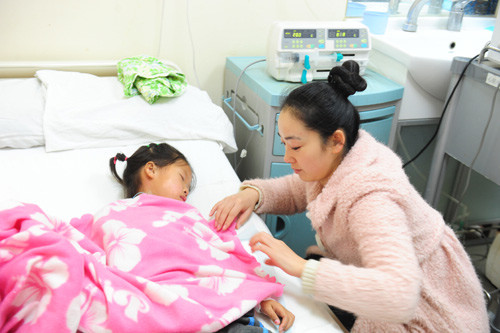|
 |
|
HOSPITAL VISIT: Cui Lanxin visits a girl who received treatment in a hospital with financial support from the Chunmiao Children's Aid Foundation in November 2011 (COURTESY OF CHUNMIAO FOUNDATION) |
Cui found a doctor in Beijing who was willing to treat the boy, and in a matter of days raised more than 20,000 yuan ($3,209) for the boy's successful operation.
In addition to helping children with serious illnesses, Chunmiao also hires couples to take care of physically disabled orphans and sends social workers and volunteers to help families in need.
"In the eyes of children, I find strength and warmth," she said.
After being named a recipient of the Gingko Fellowship, Cui told Beijing Review that the award will not only improve her life, but also give her an opportunity to learn and carry out her research.
She said that the award has prompted her to think of better ways to help children. Her organization has just made a five-year plan. It plans to cooperate with more hospitals across the country, sponsor treatment of more types of diseases, and lobby for public policies benefiting children.
A unique program
Differing from other charitable programs, the Gingko Fellowship sponsors professionals rather than an organization. This philosophy has triggered debate about why the Narada Foundation gives money to philanthropists rather than people in need, poor children in particular.
Xu Yongguang, Chairman of the Narada Foundation, said that currently, charitable organizations in China are short of talented people. He said that although many young persons are passionate about careers in nonprofit work, many have to give up their dreams to make a living because charity work is low paying.
Data released by National Bureau of Statistics in May 2011 showed that the monthly pay for employees of social organizations averaged 740 yuan ($119), which was equivalent to 43 percent of that for employees in the private sector and 24 percent of that in the public sector. Moreover, nearly 40 percent of charitable organizations did not offer insurance benefits, according to a report released by the Narada Foundation in 2010.
After the 2008 earthquake in Sichuan Province, many charitable organizations have sprouted up in China. How to attract, cultivate and retain talented people has become an issue for non-profit organizations.
"A shortage of funding makes it difficult for charities to find talented people, while a lack of talented people makes it difficult for charities to attract more funding," Xu said.
Through the Gingko Fellowship, the Narada Foundation aims to help outstanding young charity practitioners remove obstacles to their personal development to help them grow into charity leaders.
"Every industry needs professionals to fuel its growth, and the charity industry is no exception," said Lin Hong, a project officer at the Narada Foundation. She said that young NGO leaders shoulder great social responsibilities and are under heavy pressure, so support to them will promote both their personal growth and the growth of philanthropic institutions.
Liu Yi, Director of the China Mangrove Conservation Network, was named a recipient of the fellowship in 2011. "The funding provided by the Gingko Fellowship is valuable. It recognizes the real value of NGO staff, and on the other hand, it has firmed up my determination to continue to engage in charity," Liu said.
Sun Heng, founder of the Beijing Workers' Home, a charitable organization serving migrant workers, was also named a recipient in 2011. He said that during a trip to the United Kingdom funded by the program, he visited local charity stores, which inspired him to open secondhand stores for migrant workers in China.
Email us at: wanghairong@bjreview.com | 